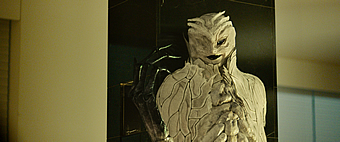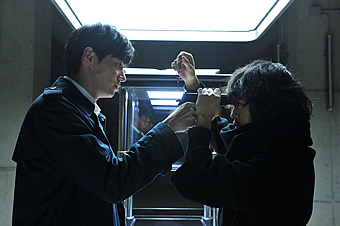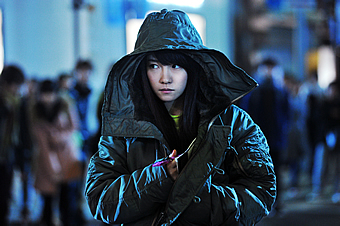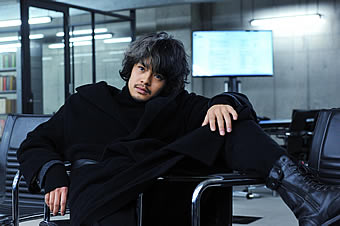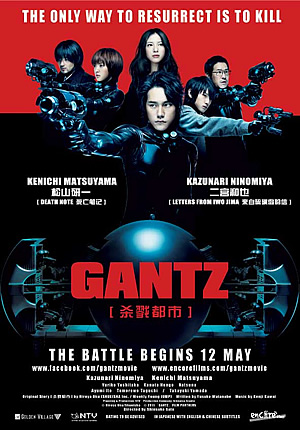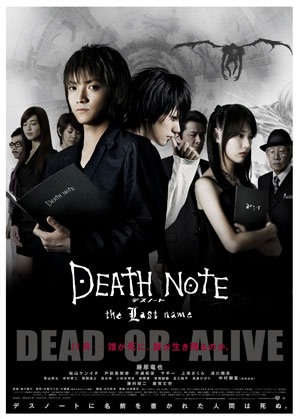DEATH NOTE: LIGHT UP THE NEW WORLD (2016)
Genre: Fantasy/Action
Director: Shinsuke Sato
Cast: Masahiro Higashide, Sousuke Ikematsu, Masaki Suda, Erika Toda, Rina Kawaei, Eiichiro Funakoshi, Sota Aoyama, Mina Fujii, Ryosuke Takei
Runtime: 2 hrs 15 mins
Rating: PG (Some Violence)
Released By: Encore Films and Golden Village Pictures
Official Website:
Opening Day: 10 November 2016
Synopsis: 10 years has passed since the Death Note murders and the final confrontation between Kira and L. Again, the shinigami ('God of Death') sends Death Notes to the ground, and the world soon falls into chaos. A ripple of mass murders caused by the Death Notes occur in the United States, Japan and other countries around the world. Mishima (Masahiro Higashide), a member of the Death Note special task force, takes up the case with 6 other investigators. Famous private detective Ryuzaki (Sousuke Ikematsu), who is the rightful successor of L, joins in the investigation. They discover that 6 Death Notes currently exist in the world. While they are investigating the case, cyber terrorist Yuki Shien (Masaki Suda) sends a computer virus throughout the world's systems. The virus carries a video of Kira that says to surrender all 6 Death Notes... Who will be the first to secure all 6 Death Notes?
Movie Review:
If you’ve never heard of L, Light, Kira, Misa, Ryuk or for that matter the Death Notes, then we suggest that you catch up with the first three movies of the ‘Death Note’ film franchise before watching this fourth chapter. Oh yes, despite set ten years after ‘Death Note 2: The Last Name’, this new instalment by ‘Gantz’ and ‘I Am A Hero’ director Shinsuke Sato draws heavily from its predecessors – among the key members of the task force set up to investigate the new rash of Death Note murders is Ryuzaki (Sosuke Ikematsu), an Interpol officer who has inherited L’s DNA and therefore not only his spiritual but also biological successor; the main nemesis is also codenamed ‘Neo Kira’ (or ‘New Kira’), after the nickname that Light uses to execute his own brand of vigilante justice; and last but not least, there are appearances by L, Light, Misa and Ryuk in both physical and digital form to draw reference to their legacy from the earlier movies.
It is therefore somewhat inevitable that ‘Death Note: Light Up the New World’ is compared against the earlier Shūsuke Kaneko’s duology, but unfortunately that comparison does no favours to this latest addition. Central to the thrill of the first two ‘Death Note’ movies was the battle of wits between L and Light, each of whom recognized the imperfections of the existing system of law and order but had fundamental disagreements over how to make things right – and between them of course was the death god Ryuk, who had his own ambitions but was ultimately constrained by the rules governing the gods assigned to the ‘death note(book)’. That same cerebral tension is sorely missing in this adaptation, which struggles to summon the same level of cleverness in the to-and-fro between Ryuzaki and Yuki Shien (aka the ‘Neo Kira’); neither do we find the same exchange of intellectual plotting between Ryuzaki and his fellow bright-eyed investigator Tsukuru Mishima (Masahiro Higashide), who have their fair share of run-ins given the former’s unconventional methods.
Worse, in trying to be smart, Sato and his screenwriter Katsunari Mano tie the narrative in some implausible twists and turns especially in the last half-hour. The so-called ‘Neo Kira’ turns out to be someone else. Mishima is not quite who he says he is. Ryuzaki ‘cheats’ death in a similar way that L used to trap Light. And one of Mishima’s teammates turns out to be the vengeful sister of a victim who died at the hands of the ‘Neo Kira’. As fast-paced as these revelations come, they come off unconvincing. Are we supposed to accept that Ryuzaki can just waltz into the Metro Police’s headquarters and break Mishima out of detention, after he is accused by his superior of withholding critical information from the investigation? Are we supposed to accept that the both of them can then access the same headquarters’ vaults to retrieve one of the ‘death note(books)’ the Police has managed to retrieve? Indeed, there is a blatant disregard for logic as the film tries to stay one step ahead of its audience, but the surprises are just too far-fetched.
Without sufficient character work between Ryuzaki, Mishima and Yuki Shien, it is pretty much left up to the plotting to sustain interest throughout its two-hours plus runtime. Admittedly, things do start off intriguing as not one but six notebooks are found to be circulating around the world – which is the reason for a Russian prologue that sees a doctor discover one of them and unintentionally cause the death of one of his close friends/ patients – but, for obvious budgetary reasons, these notebooks quickly and inexplicably find themselves in Tokyo, Japan, which the taskforce comprising of only Japanese is assigned to track down. A cyber-terrorism link that could have taken the story in a fresh new direction is also under-developed, such that the narrative is reduced to no more than a police procedural around the hunt for the ‘Neo Kira’. There is a fair bit of excitement no doubt, but the fact that the proceedings unfold on a much smaller scale is inevitably disappointing.
Sadly too, the combined talent of Higashide, Ikematsu and Sada cannot quite make up for the considerable absence of Kenichi Matsuyama and Tatsuya Fujiwara (who had played L and Light respectively). There is a palpable sense of joy seeing them on the screen, which promptly evaporates once we realize that they are no more than cameos. The advances in CGI have made the ‘shinigamis’ (or ‘death gods’) look much more imposing and humbling though, including a white female one named Arma (voiced by Miyuki Sawashiro) that forms an intimate connection with Ryuzaki. But besides Ryuzaki and Arma, the bond between [notebook] bearer and god (including that between Yuki Shien and Ryuk here) is hardly fleshed out, lacking therefore the nuances which characterized that between Light and Ryuk in the previous two movies.
As an addition to the film franchise, ‘Death Note: Light Up the New World’ is probably the weakest next to ‘L: Light Up the World’. There is no exposition on the philosophical conundrums of the Death Notes, of being able to judge and decide who lives and who dies, nor for that matter of how that power changes its wielder (as it did Light). There is also little intellectual machination that the earlier two films had, or character intricacies that made L and Light such complex and fascinating characters in their own right. In place is a fitfully exciting police procedural that only becomes more and more ridiculous as it tries to outwit itself, ending on a predictably open note that leaves the possibility of a sequel all but inevitable. Alas, its very title proves a misnomer – not only does it not light up a new beginning, it pretty much casts a dull shadow on the franchise by expending much of the goodwill built up by its far superior predecessors.
Movie Rating:



(Fitfully exciting as a police procedural but little more, this new entry into the 'Death Note' film franchise lacks the wit, character detail, and thrill of its far superior predecessors)
Review by Gabriel Chong
You might also like:
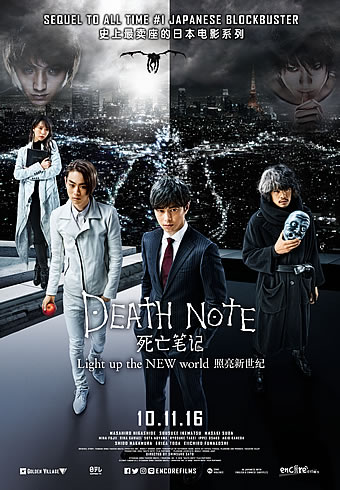
Movie Stills

